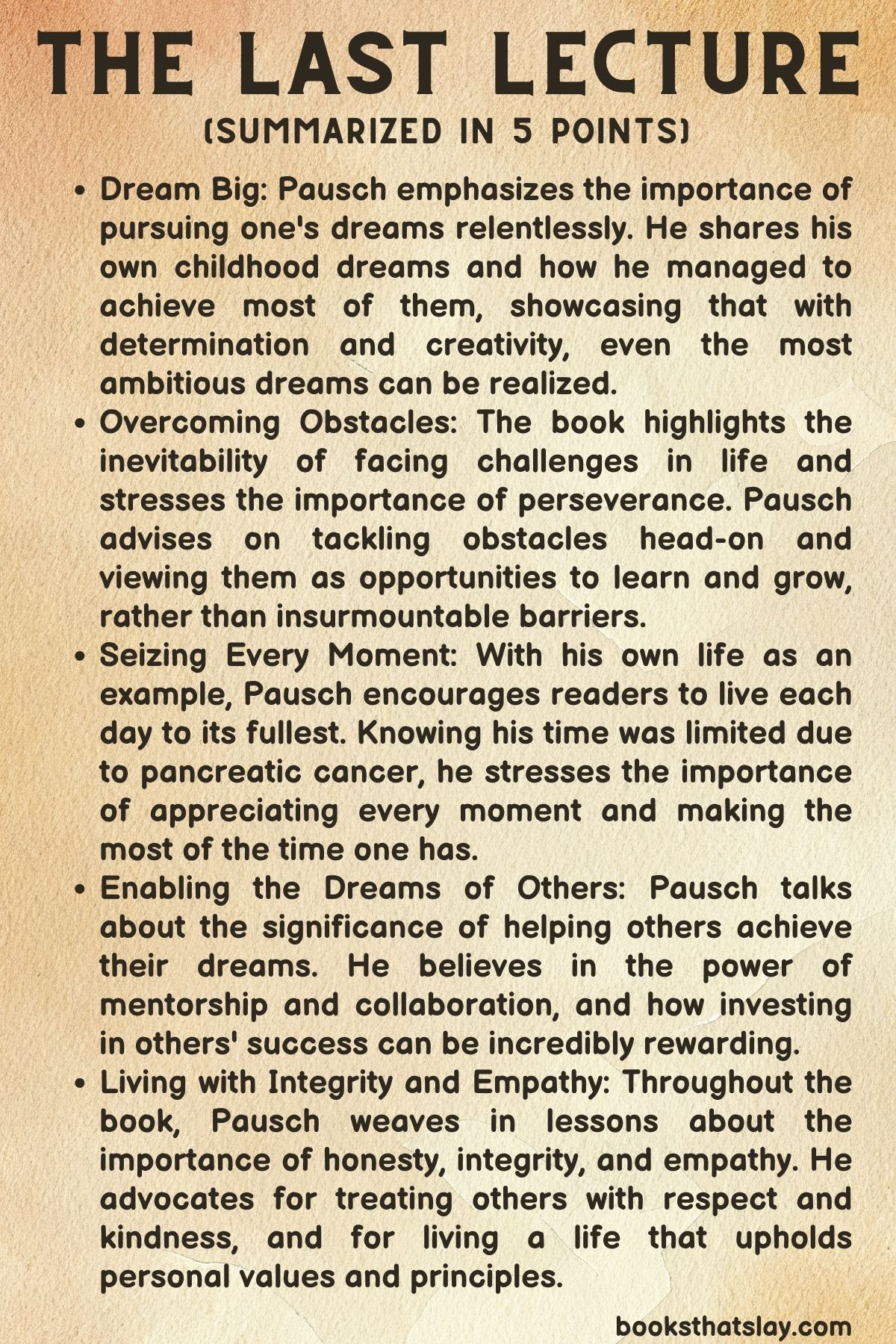The Last Lecture Summary and Key Lessons | Randy Pausch
“The Last Lecture” is a non-fiction book written by Randy Pausch, a computer science professor at Carnegie Mellon University, who had been diagnosed with terminal pancreatic cancer.
The book was published by Hyperion in 2008 and is an expansion upon a “last lecture” Pausch gave in September 2007 titled “Really Achieving Your Childhood Dreams.”
The Last Lecture Book Summary
The book is structured as a collection of life lessons that Pausch wanted to pass onto his three young children. The lessons are woven together by his personal stories and experiences that shaped his views on life, dreams, perseverance, and family.
The book begins with Pausch explaining his diagnosis and the fact that his pancreatic cancer is terminal.
Despite this grim reality, Pausch maintains a positive and resilient spirit throughout his narrative. He then moves to describe the concept of a “last lecture,” a hypothetical speech professors imagine giving if it were the last they’d ever give.
In Pausch’s case, the concept is all too real.
Pausch then delves into his life and his efforts to achieve his childhood dreams, which included becoming a Disney Imagineer, experiencing zero gravity, and becoming a professor who could inspire students.
He uses his journey towards these dreams to teach lessons about overcoming obstacles, working hard, and maintaining a positive attitude.
A significant portion of the book talks about his dream of becoming a Disney Imagineer, which he achieved after many rejections, exemplifying his lesson about perseverance.
Working at Disney allowed him to contribute to the creation of virtual reality technology, making it an even more gratifying experience.
He also stresses the importance of enabling the dreams of others. He shares about his time as a professor, where he always prioritized helping his students achieve their goals, even if it meant going out of his way.
This, he believed, was his way of giving back to the world.
In another part of the book, Pausch discusses the concept of “head fakes” or indirect learning.
He believes that while we might think we are learning one thing, we are often gaining much more valuable skills or knowledge.
For instance, sports might seem like they’re merely about athleticism, but they’re also about teamwork, sportsmanship, and perseverance.
“The Last Lecture” concludes with Pausch reiterating the importance of living life to the fullest, cherishing every moment, and maintaining an optimistic spirit.
He emphasizes the significance of family and shows profound love for his wife, Jai, and their children.
His wish is for the book to be a guide for his children, offering them fatherly advice they can refer to as they grow older.

Key Lessons
1. Embracing Obstacles as Opportunities
The book illustrates the power of perspective when facing obstacles in life.
Pausch famously said, “The brick walls are there for a reason. They’re not there to keep us out. The brick walls are there to give us a chance to show how badly we want something.”
This statement symbolizes the concept of turning challenges into opportunities.
When Pausch was diagnosed with pancreatic cancer, he saw it as an opportunity to deliver a meaningful lecture encapsulating the key lessons he had learned in life, rather than seeing it merely as an obstacle.
2. The Importance of Pursuing Dreams
Throughout the book, Pausch emphasizes the importance of following one’s dreams, regardless of their scale or feasibility.
His childhood dreams ranged from becoming a Disney Imagineer to being an astronaut, both of which he pursued in some capacity during his life. He did not allow the improbability of achieving these dreams deter him.
Instead, he tirelessly worked towards them and enjoyed the process, imparting a lesson that we should not be afraid to dream big, and that the journey towards achieving those dreams is just as important as the end goal itself.
3. The Value of Time
Pausch’s diagnosis of terminal cancer underscored the finite nature of life, prompting him to make the most of his remaining time.
He consciously chose to spend his last months imparting wisdom and creating lasting memories with his family, rather than succumbing to despair.
His story teaches us the importance of using our time wisely, prioritizing meaningful activities and relationships.
As he poignantly said, “Time is all you have. And you may find one day that you have less than you think.”
4. Fostering Positive Attitude and Optimism
Even in the face of certain death, Pausch maintained an unwavering optimism and positivity.
He chose not to dwell on the negative, but instead focused on the positives of his life, like his professional accomplishments and his love for his family. He believed that life’s quality was determined by how it was lived, not by its length.
His attitude teaches us the importance of optimism and positivity, even in the face of adversity. We can choose how we react to life’s challenges and foster a positive attitude that can carry us through difficult times.
Final Thoughts
“The Last Lecture” is a poignant, inspiring narrative, filled with wisdom and insights about chasing dreams, overcoming obstacles, and living life with passion, purpose, and positivity. It serves as a lasting legacy of Randy Pausch, whose life, even in the face of death, embodied the principles he believed in.